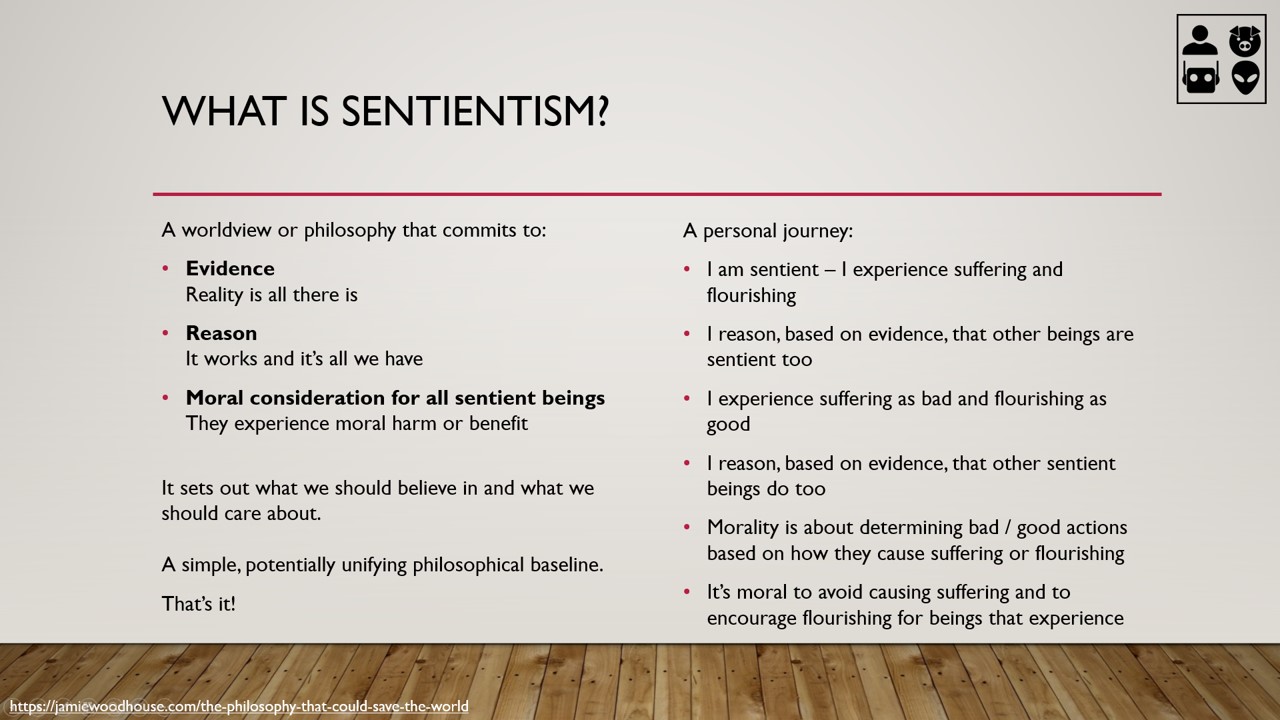- What is Sentientism?A worldview committed to evidence, reason and compassion for all sentient beings
What is Sentientism?
- Resources
Find out more about Sentientism – whether you prefer to watch,
listen or readResources
- In Action
- Groups
Our groups are open to anyone interested – not just for people who agree with Sentientism. Come join the conversation or just listen inGroups
- We are Sentientists
Learn about people with a Sentientist worldview and add yourself if you’re one of them.
Also find out which ‘celebrities’ we suspect might be Sentientists”We are Sentientists
- Resources
Sentientism: Evidence, reason and compassion
Updates! – FAQ – YouTube – Podcast – Community
Welcome! – thank you for visiting and, hopefully, for being curious about Sentientism: “Evidence, reason and compassion for all sentient beings.”
Sentientism is a philosophy or worldview – a way of thinking about what’s real and what matters.
Sentientists use evidence and reason to work out what to believe in, so don’t hold supernatural beliefs.
Sentientists also have compassion for every sentient being – any being capable of experiencing, particularly experiencing suffering or flourishing. Roughly speaking, that’s human and non-human animals, but other types of being could conceivably be sentient too.
“Evidence, reason and compassion for all sentient beings” sounds fairly obvious, but it has some radical implications and most people on the planet disagree with it – so far…
This site has video, audio and writing about Sentientism and we have a YouTube channel for your eyes and a podcast for your ears. This FAQ answers some common questions. We post updates here!
For a more personal touch, you might like to read some of the messages people are leaving on our “Wall of Sentientists”. See if you can spot the “celebrities” on the wall or on our Suspected Sentientists page. You can even add yourself if the philosophy fits personally.
There’s a global movement starting to grow up around Sentientism. Anyone interested is welcome to join our forums – Sentientist or not.

The commitment to evidence and reason means that Sentientism, like secular humanism, doesn’t hold to any supernatural beliefs. Having compassion for all sentient beings means sentientists see causing harm or death to a sentient as morally negative.
Beings that have sentience (or sentients), are those that can experience – both suffering and flourishing. Sentient beings today include humans and non-human animals – the clear priorities. However, sentient beings could potentially include artificial and alien intelligences should we create or encounter them.
If Sentientism sounds interesting, come and join our friendly, global community here. Anyone interested is welcome, whether or not you count yourself as a sentientist. We have people from around 80 countries involved to date – a mix of academics, activists, writers, policy people and interested lay people like me.
If you’d like to find out more you can read our Sentientism FAQ and some magazine articles on Sentientism here , watch video here and listen to some the podcasts about Sentientism here. Please let me know what you think – in comments below or on one of our community groups.
Once you’ve learned about Sentientism, you might consider yourself a sentientist. If you do, visit our “I’m a Sentientist!” page and add yourself to our wall. No detail needed – you can just leave your first name or add some thoughts depending on what you’re comfortable with.
Sentientism might feel like a fairly niche idea, but it has far reaching implications. This piece sets out some ideas about what might disappear in a sentientist world. and our “How?” section has ideas about how you might be able to make the world a little more rational and compassionate.
Here’s another piece that compares sentientism to some related philosophies and movements. Hopefully this helps to clarify why I think it is distinctive and valuable. The following slides show some of those comparisons and set out where Sentientism came from.


This is a short read covering my thoughts re: “Is Humanism good enough” and pointing out where sentientism is an improvement.
This piece argues we should integrate animal, human and even artificial or alien intelligence rights into sentient rights. Here, I’ve set out what a Universal Declaration of Sentient Rights might look like.
To date, there’s little mention of sentientism outside of philosophical circles. Given its importance — I feel that’s odd. If you’re interested in talking about the topics raised or finding out more, we run a range of online forums you can find here. Anyone interested is welcome, you don’t need to consider yourself a sentientist.
If you think sentientism is important and would like to help raise awareness of the idea, I’ve written some ideas about how you could help here.
There’s a Sentientism Wikipedia page, a Simple English Wikipedia page and an Animawiki one – feel free to help improve them.
and stay up to date